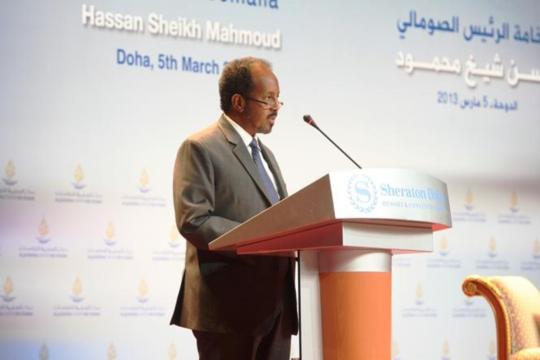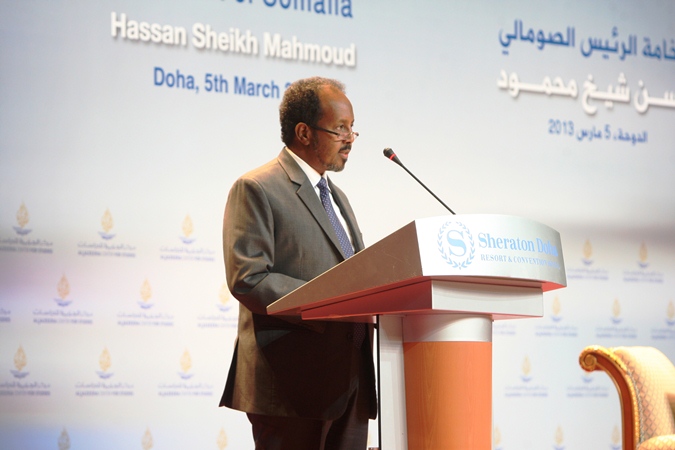
 |
| Somali President Hassan Sheikh Mahmoud during lecture on 5 March 2013. |
Al Jazeera Center for Studies hosted Somali President Hassan Sheikh Mahmoud on 5 March 2013 for a lecture on Somalia's current complexities and future challenges. The lecture was given before an audience of diplomats, researchers, officials, Al Jazeera journalists, and several members of the Somali community in Doha.
Al-Shabaab: The Most Prominent Challenge
The issue of Al-Shabaab Al-Mujahideen in Somalia, according to the president, is an indication of the increase of armed jihadist movements around the world. This is not specific to Somalia alone but to the entire globe. The president reported that this movement’s organisational capacity has been shattered and is now declining. Furthermore, the Somali members of the movement have been invited by a small section of the government to renounce violence, surrender arms, reintegrate into society and engage in the political process. The president’s lecture concluded that unemployment, poverty and ignorance about the movement are among the main reasons why some Somali youth join it. A significant factor is thus the monthly financial support of about 50 to 100 dollars that is received. 75 percent of school-aged children are deprived of education. This is another reason why youth join Al-Shabaab and pirate groups.
Hence, he stressed, the importance of developing a plan that would combine consultations between the government and wise leaders (such as elders and tribal and religious leaders) to influence the youth, work to build institutions for their rehabilitation, and stop their involvement in acts of violence. Also, as per the president’s perception, foreigners in Al-Shabaab should leave Somalia while
the youth - with the exception of those accused of war crimes - must be reintegrated into everyday life.
Apart from the Somali government’s relations with Al-Shabaab, it is necessary to create frameworks for Somali reconciliation that would unite all parties for the purpose of cooperation and facilitating dialogue. This is one of the objectives of the government, which seeks to win the hearts and minds of Somalis in all of Somalia.
Reform Attempts despite the Magnitude of Challenges
Despite the government’s awareness of the complexities, dynamics and challenges faced by the people, the current situation in the country has, according to the lecture, attained real progress, change and a peaceful transition of power through a political solution and dialogue, which is regarded as one of the gains made during this period. Few imagined that Somalia could hold presidential elections through which there could be a transition of power without bloodshed and violence. He stressed that there is no way to return to square one. The government will hold elections for local, municipal, and regional elections in the coming days. This will be followed by the building of a united federal union (i.e. a federal republic).
Somalia and the Different Contexts
According to the president, the absence of Arab diplomatic representation in Mogadishu is concerning. Arab and Islamic countries should therefore open embassies in Somalia to strengthen the confidence of the international community in the country. It is without a doubt that security is still a major obstacle such an endeavour. Of all the Arab and Islamic countries, only the Sudan, Yemen and Turkey have embassies in Somalia.
It is obvious that due to conditions in the country, Somalia was forced to accept the presence of foreign African forces, mostly from neighbouring countries such as Kenya and Ethiopia. When the government can restore trust among the people and address the various issues through dialogue, it will then, according to the president, ask the foreign troops to leave.
The lecture was followed by discussions and questions expanding on the topic, elaborating on aspects that the president mentioned, and allowed for clarity. The responses complemented what was not mentioned in the presentation.